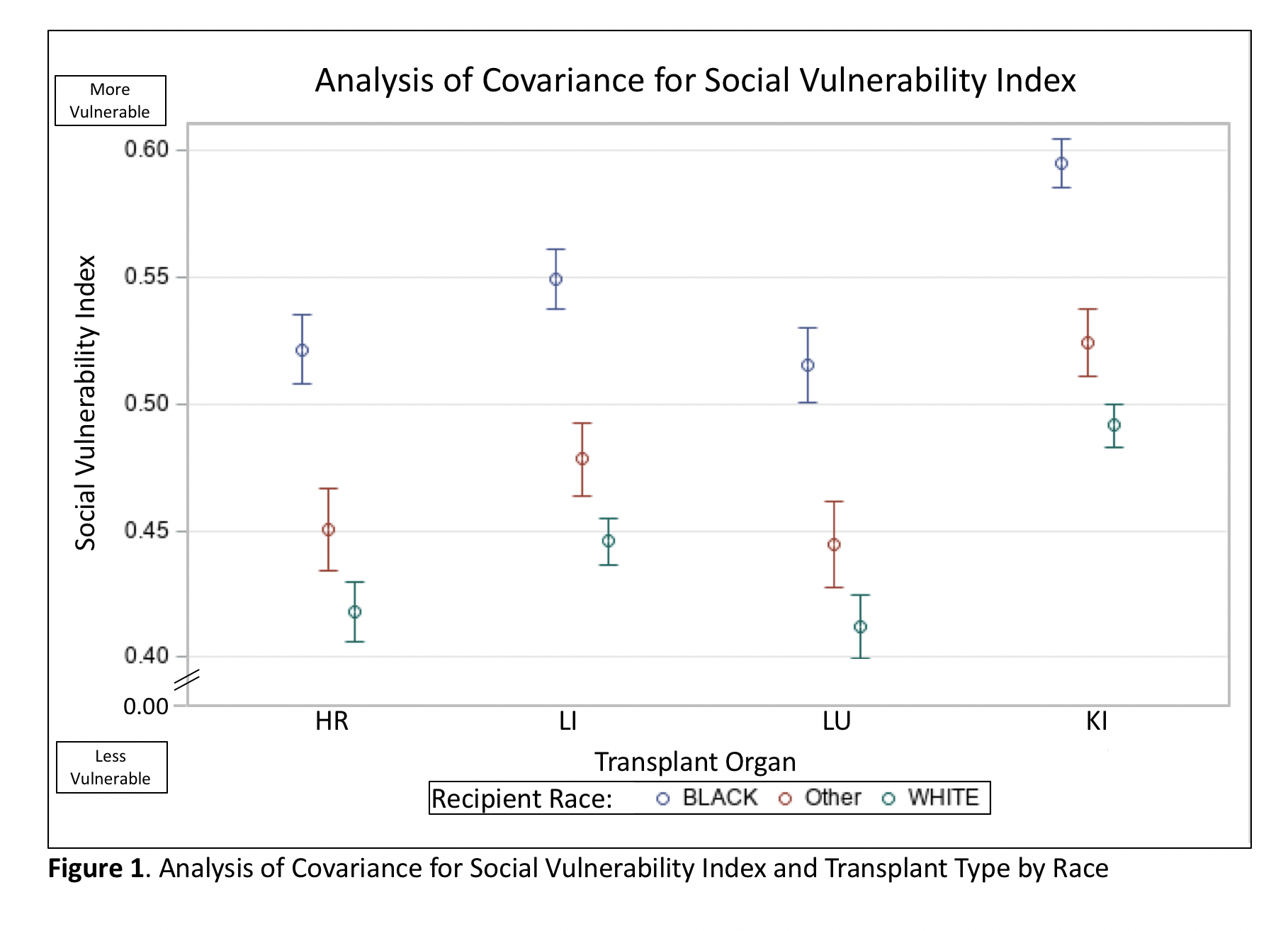Black Transplant Recipients Reside in the Most Socially Vulnerable Communities
1University of Alabama at Birmingham Hospital, Birmingham, AL, 2Hospital of the University of Pennsylvania, Philadelphia, PA
Meeting: 2021 American Transplant Congress
Abstract number: 1266
Keywords: African-American, Cadaveric organs, Multivariate analysis, N/A
Topic: Clinical Science » Organ Inclusive » Non-Organ Specific: Disparities to Outcome and Access to Healthcare
Session Information
Session Name: Non-Organ Specific: Disparities to Outcome and Access to Healthcare
Session Type: Poster Abstract
Session Date & Time: None. Available on demand.
Location: Virtual
*Purpose: Racial and socioeconomic disparities in post-transplant outcomes have been described for all solid organ recipients. While the importance of the social determinants of health on transplant outcomes is increasingly recognized, community-level vulnerability among transplant populations is not well understood. The purpose of this study was to describe and compare comprehensive social vulnerability profiles among solid organ transplants recipients.
*Methods: The Scientific Registry of Transplant Recipients was utilized to identify adult, deceased donor transplant recipients of either kidney, liver, heart, or lung only between 1/1/2018-12/31/2018. Using the Centers for Disease Control and Prevention’s 2018 Social Vulnerability Index (SVI), community-level social vulnerability was defined as the median SVI among census-tracts included in each recipient’s zip code. Analysis of covariance (ANCOVA) was performed to determine if SVI differed among transplant types by race, controlling for patient-level characteristics. Tukey-Kramer adjustment for multiple comparisons was used to determine significant differences between transplant types.
*Results: 24,566 solid organ transplant recipients were included, of which 54%, 26%, 11%, and 10% received kidney, liver, heart or lung transplant, respectively. SVI varied significantly among the different organ types (F=194.75, p<.0001). Kidney recipients were found to have significantly higher SVI (e.g. greater social vulnerability; adjusted mean SVI=0.52) compared to liver (adjusted mean SVI=0.47, p<.0001), heart (adjusted mean SVI=0.44, p<.0001), or lung recipients (adjusted mean SVI=0.44, p<.0001). Moreover, black recipients (adjusted mean SVI=0.52) of any organ type had higher SVI in comparison to white (adjusted mean SVI=0.42, p<.0001) or other race counterparts (adjusted mean SVI=0.45, p<.0001; Figure 1).
*Conclusions: Kidney transplant recipients lived in communities with significantly greater social vulnerability compared to other solid organ transplant recipients, while black transplant recipients lived in the most socially vulnerable communities, regardless of transplant type. These data motivate further investigation to understand the interplay between recipients’ environments and post-transplant outcomes among all solid organ transplants.
To cite this abstract in AMA style:
Killian AC, McLeod MC, Shelton B, Reed RD, MacLennan P, Qu H, Orandi BJ, Sawinski D, Locke JE. Black Transplant Recipients Reside in the Most Socially Vulnerable Communities [abstract]. Am J Transplant. 2021; 21 (suppl 3). https://atcmeetingabstracts.com/abstract/black-transplant-recipients-reside-in-the-most-socially-vulnerable-communities/. Accessed March 5, 2026.« Back to 2021 American Transplant Congress

